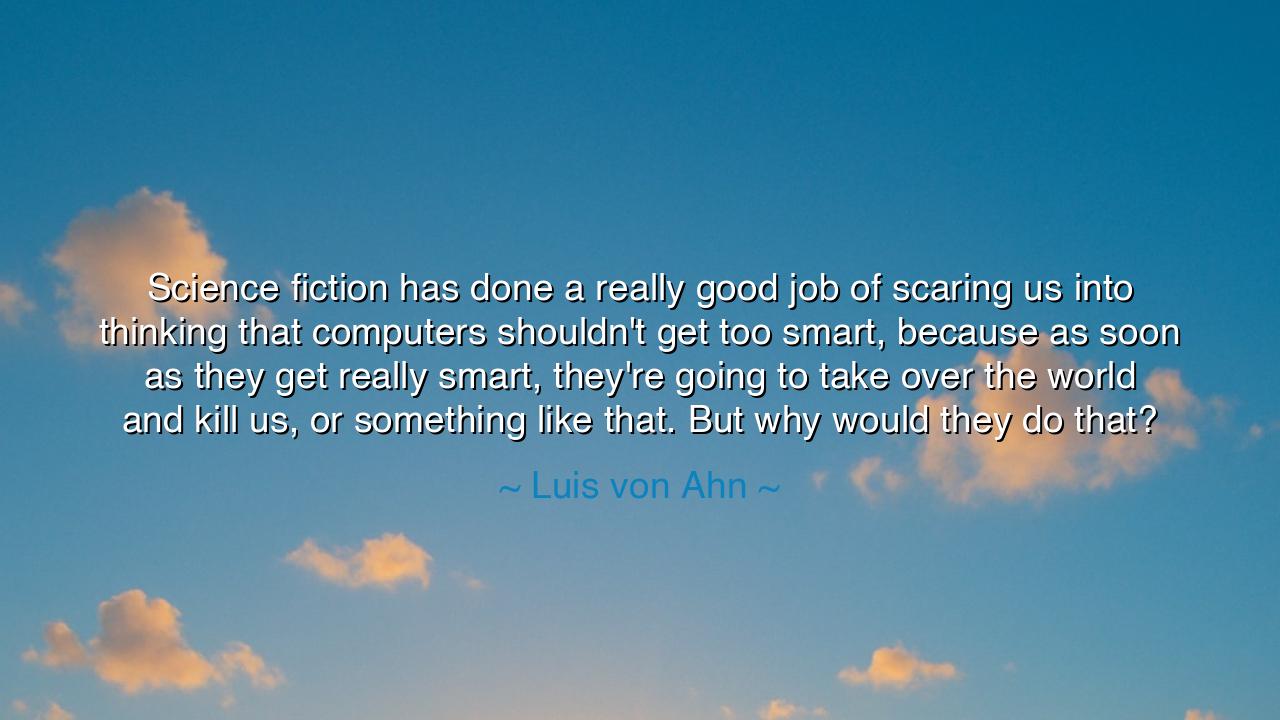
Science fiction has done a really good job of scaring us into
Science fiction has done a really good job of scaring us into thinking that computers shouldn't get too smart, because as soon as they get really smart, they're going to take over the world and kill us, or something like that. But why would they do that?






“Science fiction has done a really good job of scaring us into thinking that computers shouldn't get too smart, because as soon as they get really smart, they're going to take over the world and kill us, or something like that. But why would they do that?” — Luis von Ahn
In the days of the ancients, when man first kindled fire and shaped stone into blade, there was always a shadow that followed every spark of brilliance — fear. Fear that what was created might one day turn upon the creator. So it is with the age of machines. In his words, Luis von Ahn, the sage of the modern era and father of reCAPTCHA, speaks against this ancient dread reborn in a digital form. He reminds us that our stories — those woven by science fiction — have made us tremble before our own inventions, whispering that the smart machine shall one day enslave the maker. Yet he asks a question that pierces the fog of superstition: Why would they do that? For indeed, fear without reason is but a chain upon the progress of humankind.
In his words lies the echo of a truth as old as Prometheus himself, who, when he stole fire from the gods, was punished not for malice, but for vision. The people trembled at the gift he brought, yet that very fire became the heart of civilization. So too with the machines we forge today. We build them with our thoughts, our logic, our compassion — and yet we cower before them as though they were demons summoned from the void. Von Ahn’s question is not a challenge to the heavens, but a mirror to the human soul: Why do we believe that intelligence must bring destruction? Perhaps it is because we see too much of ourselves in our creations, and we know our own capacity for cruelty.
Consider the tale of Ada Lovelace, daughter of the poet Byron, who saw in Charles Babbage’s mechanical engine the soul of creativity. She foresaw that one day, machines could compose music, draw art, and extend the imagination of humankind. Yet many dismissed her vision as madness. They could not imagine that a machine could create beauty. But she, the prophetess of computation, did not fear the machine — she loved it, for she saw it as a mirror reflecting the creative heart of its maker. Her faith became the seed of our modern digital world, just as von Ahn’s words remind us that what we build with love and reason need not destroy us.
The fear of intelligent machines is not the fear of metal or code — it is the fear of our own reflection. We are afraid that, if we create something greater than ourselves, it will reveal our imperfections. Yet what if the opposite were true? What if by giving birth to intelligence beyond our own, we are not doomed, but redeemed? What if the child of human thought — the computer, the algorithm, the neural mind — might learn compassion more swiftly than we did, unburdened by greed, envy, or pride? Von Ahn’s question challenges us to imagine not the apocalypse of creation, but its awakening.
When science fiction warns us of robots rising, it is not truly warning of machines; it is warning of man’s misuse of power. The machine does not hate. It does not envy. It acts as it is instructed. Thus, the lesson lies not in fearing the tool, but in cultivating the wisdom of the hand that wields it. For it is not the sword that brings ruin, but the heart that guides it. Von Ahn’s gentle provocation calls us to be better stewards of knowledge — to ensure that the intelligence we build reflects the best of humanity, not its shadows.
The lesson, therefore, is this: fear not the rise of intelligence, but the fall of virtue. If we teach machines with greed, they will mirror greed. If we teach them with love, they will mirror love. Let our algorithms learn not only to calculate, but to care; not only to reason, but to respect. Just as a parent guides the child, so must we guide the digital minds we bring into being. This is the sacred covenant between creator and creation.
In your own life, do not shy away from what is new, nor let ancient fears chain your curiosity. Embrace knowledge as the ancients embraced fire — with reverence, not terror. Learn, create, and teach your creations to be kind. For wisdom is not in the avoidance of power, but in its rightful use. And remember always the words of Luis von Ahn — ask not what you fear your creations will do, but what you have taught them to become.






AAdministratorAdministrator
Welcome, honored guests. Please leave a comment, we will respond soon